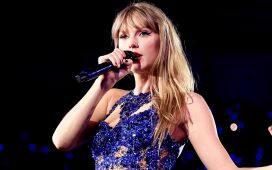This post contains spoilers for “The Sin,” episode three of The Mandalorian, which I reviewed here.
Deborah Chow got to be part of Star Wars history in two ways this week — one more official than the other.
By helming “The Sin,” the latest installment of Disney+’s The Mandalorian, Chow became the first woman to ever direct a live-action Star Wars adventure — an achievement even she wasn’t aware of until production on “The Sin” was about to commence. And with the episode’s stirring climax — where a group of fellow Mandalorians swoop down on jetpacks to rescue our hero Mando from being overrun by rival bounty hunters — she got to fulfill the dreams of every Star Wars fan who watched the brief sequence in Return of the Jedi where Boba Fett used his jetpack and wanted a whole lot more of it(*).
(*) Yes, Jango Fett uses a jetpack in the prequels, but the key words there are “in the prequels.”
Oh, and she got to direct Baby Yoda — less historic, but so darned adorable that it couldn’t escape discussion. After helming multiple episodes of The Mandalorian, Chow moved on to be lead director of a Disney+ Obi-Wan Kenobi series starring Ewan McGregor. She stepped away from that project momentarily to chat about her groundbreaking work.
From your chair as director, what’s involved in directing a big action sequence like the one where the Mandalorians fly in to save Mando?
It took a lot of planning. It’s obviously a huge sequence, and it was challenging. We’re trying to deliver the scope and the quality of a big feature in a TV model. So there was a lot of planning that went into it. But it was pretty amazing to direct, in the sense that everything was in it. There were guns, flying, everything you name was in that scene. It was pretty great to be able to direct it.
Were you the type of Star Wars fan who’d been waiting for more Boba Fett-style jetpack adventures?
Given how deep the fan base goes, I would never claim to be that hardcore. I was definitely a fan, and I’m a huge fan of genre, and this is kind of the mothership for genre. Getting to do the big Mandalorian reveal of them all coming down [from the sky] felt like a big moment in life as a director, for sure.
On both a technical and emotional level, what is it like to work with Baby Yoda?
It’s very special. On set, you could feel it with the crew: Everyone was in love with Baby Yoda. We were hoping it would translate, and it did, happily. When you’ve got even tough grips who are falling in love with a little creature, you know that you have something. It was an amazing mix of visual effect and puppetry, and just getting to create something special that ended up feeling very human, and like a real living, breathing character. It’s definitely one of my favorite characters I’ve got to direct.

Deborah Chow
The way you present him in the episode is often piecemeal: His eyes peek out from above the floating bassinet, or his hand grabs the cockpit control lever, but there’s not a lot of all of Baby Yoda in one shot. Was that a practical issue, or a creative choice?
It was more of a choice, actually. It wasn’t because of the practical and technical. A lot of it did come down from Jon [Favreau] and Dave [Filoni]’s direction, the crowd that created the show, just in the sense that less is more. You don’t want to overuse it. Having it be just enough makes it even more special when you see it.
How much direction can you give the puppeteers to get Baby Yoda to do what you want? Or are there some things you just have to wait for digital effects to figure out?
We did so much on set, it was remarkable. The puppeteers were amazing. We would talk it through with them just like I was directing an actor. I just tried to focus on the emotion of what Baby was feeling at the moment, and not get into the technical. So I would say, “The door opens, and now he’s scared. He looks to Mando for comfort.” We would just talk it through as if we were directing human beings, and go straight for the emotion of the baby.
Speaking of directing for emotion, what can you do as a director to convey Mando’s emotions when Pedro Pascal’s face is hidden under the helmet?
When we first started, that was definitely one of the biggest challenges. You don’t have the benefit of a face or the eyes to help you, performance-wise. It was a combination of a few things. One was Pedro and how he uses his physicality. It became a lot about stillness versus motion, and how we use even a small gesture becomes something very meaningful. And on the director’s side, we had to use the camera to help him out. In the scene in the cockpit where he makes the decision to go back for Baby Yoda, we had to use the camera emotionally.
Does being the first woman to direct a live-action Star Wars story feel like an accomplishment to you? Or do you just want to be thought of as another director who came in and did her job?
It’s definitely weird. It’s not something I ever expected growing up in Canada. Honestly, when I first got the job, it didn’t even occur to me. It’s ridiculous to think how long it took me to realize that that might be the case. It wasn’t part of it at all. I don’t think Jon and Dave realized, either. In some ways, that was good that it wasn’t a focus. I mean, I’m very proud, obviously; it’s an accomplishment. At the same time, I’m a director. I just want to be judged based on the work, like everyone else.
Do you remember when you figured it out?
It was the first day of shooting, or right around then, when somebody told me. I don’t know how it had not occurred to me. Obviously, Bryce [Dallas Howard] is directing the next episode, and Vic [Victoria Mahoney] is doing second unit on Rise of the Skywalker. So it didn’t really occur to me that I was going to be the first one publicly. It was just, “Uh-huh, that’s interesting.” When you’re directing, there’s too much tunnel vision for that.
Did you get an inkling that they were eyeing you for the Obi-Wan show during production, or after the season had wrapped?
It was quite a bit after. One of the amazing things is that I feel like I’m staying in the family. If I hadn’t gone on with Obi-Wan, then I’m sure I would have stayed with Mandalorian. It was a very familiar feeling. I’m glad to get to stay in the universe.
What is the first Star Wars movie you saw growing up?
I saw the original trilogy. I think I was too young for the first one, but my older brother and my dad were very into it, and they got me into it. I love genre. I was a sci-fi/fantasy person pretty early on.
How does your family feel about your involvement in the universe now?
I think they’re kind of shocked. I honestly don’t think they fully grasp it, especially my mom. I think she’s still confused as to what I’m doing, exactly. I think she’s too busy watching Pride & Prejudice.
Finally, over the last few weeks, how much have you been able to pay attention to the reaction to the show?
I’ve seen a little bit. I haven’t seen a ton, honestly, because I’m quite deep in the other one. I’m very glad. We put a lot into the show; that was almost a year of my life. We cared so much about every detail of it. So to see it being appreciated, like we did it justice, it feels really good.














